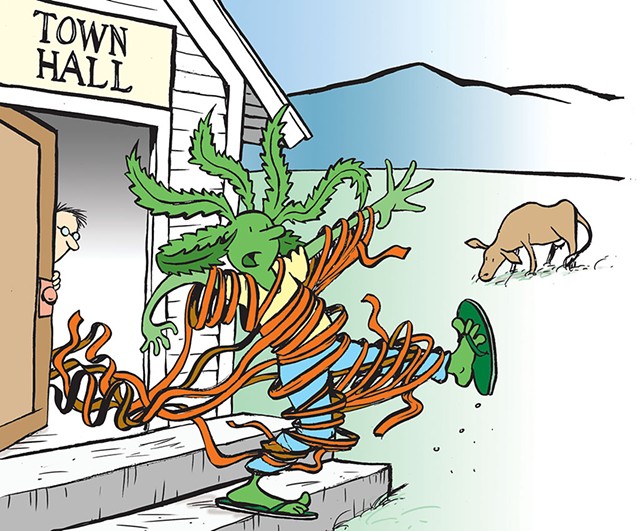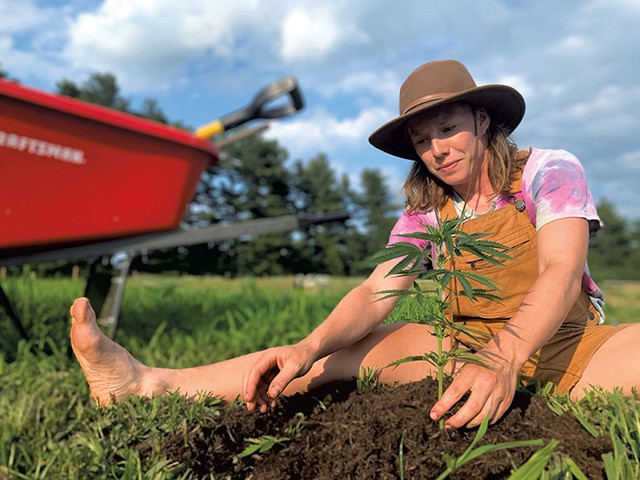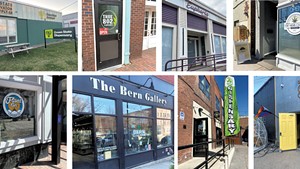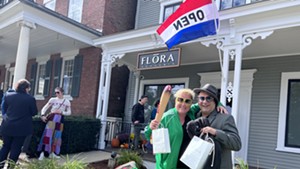
- Tim Newcomb
When Jahala Dudley sought a permit in the spring to convert a barn on her flower farm in Plainfield into a cannabis nursery, she recalled, a Development Review Board member asked her an interesting question: How did Dudley think the town should classify cannabis cultivation in its zoning bylaws?
To Dudley, the answer seemed obvious. "I wanted to say 'farming,'" she said, "but that's not allowed."
Vermont law specifically excludes cannabis from its definition of agricultural products, which means that its cultivation is subject to municipal zoning regulations from which other farming activities — the construction of a greenhouse for tomatoes, for instance — are generally exempt. The Vermont Cannabis Control Board, which grants licenses and oversees every aspect of the industry, requires entrepreneurs such as Dudley to satisfy local permitting requirements before they can legally grow or sell pot.
But the state board has no authority to tell municipalities how to address cannabis establishments in their bylaws, leaving town and city officials to figure out the scope of their regulatory power as the adult-use market officially opens in Vermont. The ploddings of municipal bureaucracy — and, in certain cases, unexpected red tape — are testing the patience of some would-be early movers in cannabusiness.
"It's chaos, to be honest," said A.J. LaRosa, a Burlington attorney who specializes in zoning and land-use law. "And it's chaos that only springs up when people are, like, halfway into the system." By the time a cannabis applicant appears before their local zoning administrator or Development Review Board, they've likely already bought land, signed a lease or otherwise invested a healthy chunk of their savings into their enterprise.
Dudley said she braced herself for an arduous permitting battle, but her experience with the Town of Plainfield turned out to be fairly painless. After a perfunctory hearing — "There were more dogs than people at that meeting," she joked — the Development Review Board signed off on her proposal as a home occupation, a zoning designation that allows commercial enterprises on residential property. Her grow house will supply some of the weed to the dispensary Dudley hopes to open in the near future on South Union Street in downtown Burlington, between Folino's Pizza and the Wallflower Collective.
Dudley, whose company, Grass Queen, is all women- and majority queer-owned, obtained her cultivation license this summer from the state Cannabis Control Board and is still waiting on her retail license. She said she had no trouble getting a zoning permit for her shop in Burlington, but she was surprised to learn, in mid-August, that the city would require her to secure yet another permit through Burlington's newly formed Cannabis Control Commission, which consists of the 12 members of the city council.
Dudley, along with three other cannabis business owners, got the green light during the September 19 city council meeting. If all goes according to plan, she said, she thinks she might be open by mid-November, at the earliest.
While towns must vote to allow retail sales, as some 70 have done so far, cultivation is legal statewide. Twenty-three towns and cities, including Burlington, have opted to create their own cannabis control commissions, which municipalities can form at any time to add another round of vetting for proposed cannabis establishments.
In Stowe, which has not yet voted to allow retail cannabis, town officials are trying to preempt the arrival of dispensaries by coming up with new zoning rules to restrict where such businesses can operate. "As a community, we don't want to be known as 'the party town,'" said Billy Adams, chair of the Stowe Selectboard and, as of earlier this month, the town's local cannabis control commission.
Dudley said she can understand why town and city officials would want to exercise as much control as they can over the local market for a substance that's still federally illegal. But navigating state and municipal cannabis rules, she said, has demanded Job-like patience.
"For business owners, it's not just about being flexible," Dudley said. "It's about, like, being liquid."
The purview of local control boards is relatively narrow — as with liquor licenses, they can revoke a cannabis permit if the business owner isn't complying with noise or nuisance ordinances. More informally, these commissions can serve as a venue for the energetic public discourse that cannabis is liable to generate. In Burlington, a group of Old North End residents sent a letter earlier this month to the city's cannabis control commission upon learning that a dispensary was slated to go into a vacant medical supply store in their neighborhood.

- Courtesy of Kierstin Wall
- Jahala Dudley
"I think we'd just gotten to — I'll name it myself — a fear-based place about what was going to happen there and whether we were going to have channels through which we could have a dialogue about it," said Esther George, who lives in Convent Square, a residential block around the corner from the proposed dispensary on North Avenue. She said she now feels reassured that the city's permit review process will provide a forum for that dialogue, but as a therapist, she has reservations about making cannabis more accessible.
"I'm just worried that it's going to be in the fabric of our culture and that young people will assume it's harmless," she said. The image of her daughter getting on the school bus outside of a cannabis retailer, she added, "just feels weird." (The owner of the business, Euphoria Cannabis Products, was not available for an interview.)
In Charlotte, several residents recently took to Front Porch Forum to express dismay at the prospect of a cannabis greenhouse on Prindle Road, in a bucolic part of town with scenic vistas of the Green Mountains to the east. "This isn't some nice little hemp farm," wrote the journalist Adam Davidson, who moved to Charlotte during the pandemic. "It's an industrial operation that gives off massive amounts of pollution."
The growers, Red Clover Canopies, have obtained a tier 1 cultivation license, which covers canopies of 1,000 square feet or less — the smallest category in the state's permitting system.
Nevertheless, Davidson told Seven Days he was concerned about research suggesting that intensive cannabis cultivation can release harmful compounds.
"There's a process of figuring out what environmental pollution is safe to be near residential areas," said Davidson, who lives about a third of a mile from the site of the proposed greenhouse. "It just seems clear to me that the jury is very much out on cannabis cultivation, and we don't have the resources, as a town of 3,000 people, to be figuring that one out on our own." Davidson acknowledged that dairy farms, of which there are several in Charlotte, are also known polluters. But while he "kind of likes" the scent of manure, he explained, cannabis, for him, is a different story.
"I don't like the smell of cannabis," he said.
Another Charlotte resident shared a communiqué that she'd sent to town officials in which she raised concerns about the security measures — "tall" fencing, a "loud" alarm system, "24/7 lighting inside and out" — that a year-round grow operation might need. "I am advocating that we preserve the quiet rural nature of our community," she wrote in her Front Porch Forum post.
LaRosa, who represents the growers, declined to comment.
The legislature's classification of cannabis as "nonagricultural" was meant to ensure that communities would have greater jurisdiction over the industry blossoming in their midst, according to Sen. Phil Baruth (D/P-Chittenden), one of the cosponsors of the 2020 legalization bill.
"We give extraordinary latitude to agriculture and agricultural products, and we didn't want to do that for cannabis," Baruth said. "The worry was that if cannabis was an agricultural product, there would be a move to sell it at farmers markets and at roadside stands. So the idea was to make sure we still had complete control, from seed to sale."
With the exception of outdoor growers whose crop size is less than 1,000 square feet, all other cultivators are beholden to local zoning requirements, which has created a weedy conundrum for some town officials: If planting half an acre of cannabis or building a greenhouse for year-round cultivation isn't agricultural development, then what is it, exactly?
"That's definitely been a point of confusion with both applicants and municipal officials," said Nellie Marvel, the outreach and education manager for the state Cannabis Control Board. She recently led a training with the Vermont League of Cities & Towns to help municipal leaders get their bearings in this uncharted regulatory landscape.
According to Marvel, state law does not prohibit municipalities from classifying cannabis cultivation as agriculture in their zoning codes. But state law also stipulates that cannabis establishments must comply with zoning bylaws, which, in most cases, do not apply to agriculture. The result of those apparently conflicting statutes, said LaRosa, the Burlington attorney, is a great deal of confusion.
In crafting its cannabis policy, LaRosa said, "the legislature didn't need to say what needs to be said, which is what cultivation [means] for municipal regulation, period." Basically, as he put it, "it's up to 250 municipalities to figure that out on their own."
Darrick Granai, the founder of Bushy Beard Cultivation in Derby, said he had to enlist a lawyer to secure approval from the town Development Review Board to turn an 8,000-square-foot warehouse into an indoor grow facility. For almost four months, Granai said, he and his attorneys went back and forth with town officials about whether his grow could be zoned as agriculture. "It was incredibly frustrating," Granai said. "I think what it came down to was, they didn't want to get themselves in any type of trouble, but I really felt like they were looking for any way to not allow it, as opposed to trying to make it work."
Ultimately, the state control board clarified that the town could approve Granai's application as agriculture for zoning purposes, and the board gave him its blessing in late March. In addition to several thousand dollars in attorney fees, Granai estimates that he paid at least $100,000 more than he'd anticipated for construction materials as a result of price increases during the ruminations. His goal now, he said, is to get plants in the warehouse by early November, with the aim of having products for sale by February, months later than he'd hoped.
The process was a learning experience for the town, Judy Nommik, a member of Derby's Development Review Board, acknowledged. "Some people have personal feelings that slow them down in their thinking a little bit, which is OK," Nommik said. In her view, the essence of Granai's operation is agricultural, even if state law makes a distinction between cannabis cultivation and other horticultural enterprises. Her feeling on the subject, she said, is that "begonias are begonias."
The Town of Derby has since revised its bylaws to include cannabis retail and cultivation establishments, which zoning administrator Bob Kelley hopes will make the process easier for future permit-seekers.
"Now that we have everything defined," he said, "any new applications are going to be a piece of cake."














Comments
Comments are closed.
From 2014-2020, Seven Days allowed readers to comment on all stories posted on our website. While we've appreciated the suggestions and insights, right now Seven Days is prioritizing our core mission — producing high-quality, responsible local journalism — over moderating online debates between readers.
To criticize, correct or praise our reporting, please send us a letter to the editor or send us a tip. We’ll check it out and report the results.
Online comments may return when we have better tech tools for managing them. Thanks for reading.